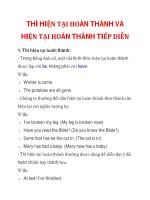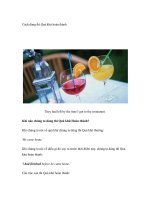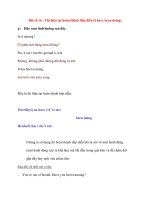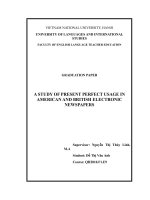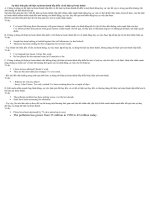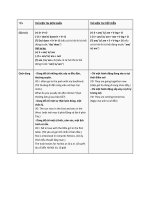Cách dùng thì hiện tại hoàn thành và hiện tại hoàn thành tiếp diễn
Bạn đang xem bản rút gọn của tài liệu. Xem và tải ngay bản đầy đủ của tài liệu tại đây (160.71 KB, 4 trang )
P
HÂN BIỆT THÌ HIỆN TẠI HOÀN THÀNH VÀ THÌ HIỆN TẠI HOÀN
THÀNH TIẾP DIỄN
I. Thì hiện tại hoàn thành
1. Về dạng thức
S
+ has/have + V
3(past
participle)
Vd:
I have decided to leave tomorrow.
She has sent an email to Luc
y
- Dùng
“has’’ cho ngôi thứ 3 số ít
- Dùng “have” cho các ngôi còn lại.
2. Dạng nghi vấn của thì HTHT:
(Từ để hỏi) + Have/has + S + V
3
. ?
Vd: Have you decided yet ?
Has she left yet ?
How long have they learned English ?
3.Dạng phủ định của thì HTHT
:
S + have/has + not + V
3
Vd:
Sue has not sent an email to Lucy.
We have not finished this chapter.
II. Thì hiện tại hoàn thành tiếp diễn
1. Dạng thức
S + has/have + been + V-ing
Vd: I have been waiting here all morning.
She has been working a lot.
Her children have been feeling ill for week.
Short form : have =’ve
has = ’s
2. Dạng
nghi vấn:
(Từ để hỏi) + Has/Have + S + been _ V-ing ?
Vd: what have you been doing lately?
How long have yoou been living here ?
3. Dạng phủ định:
S + has/have + not + been + V-ing
.
Vd
: I have not sleeping well recently
.
Short form: have not = haven’t
has not = hasn’t
III. Phân biệt sự khác nhau giữa hai thì Hiện tại hoàn thành và thì Hiện
tại hoàn thành tiếp diễn.
Thì hiện tại hoàn thành Thì hiên tại hoàn thành tiếp diễn
Tập tr
ung vào kết quả đã hoàn tất.
Vd: I have written that report for
Jackie. I didn’t take a long time.
(finished result)
Tập trung vào hành động hơn là kết
quả.
Vd: I’ve been writing that report
for Jackie and i still haven’t
finished. (Action)
Ch
o những chi tiết về những mức
đội thực hiện được bao nhiêu .
Vd: I have written four emails.
(how many)
I have done a lot of cooking and
cleaning this afternoon. (how much)
Nhấn mạnh độ dài thời gian của
hành động. ( làm được bao nhiêu).
Vd: She’s been waiting here all
morning. (length of time)
BÀI
TẬP LUYỆN TẬP THÌ HIỆN TẠI HOÀN THÀNH VÀ HIỆN TẠI
HOÀN THÀNH TIẾP DIỄN
I. Put the verb in the brackets into the present perfect or present perfect
continous tense.
1.
A
: “Troy” is on the Rex. (you see) it ?
B
: No, not yet. Shall we go
?
I (look) forward to seeing it for ages.
2.
A
: what’s the matter ? you look really tired!
B
: I am ! I (study) all day, and i (not finish) yet.
A:
Oh well, time for a break.
3. A: I (phone) Carol all day, but there is no reply.
B:
I expected she (go) swimming with her friends.
4.
A: (you hear) the news
?
B:
What news
?
A:
Someone (rob) the bank at the end of road.
5. A: Why is your leg in plaster ?
B: That’s a silly question! I (break) it, of course.
A: Someone (write) “give me a break” on the plaster.
KEY.
1.
Hav
e you seen – have been looking
2.
h
ave been s tudying – haven’t finished
3.
h
ave been phoning – has gone
4.
Hav
e you heard – has robbed
5.
h
ave broken – has writte
n

